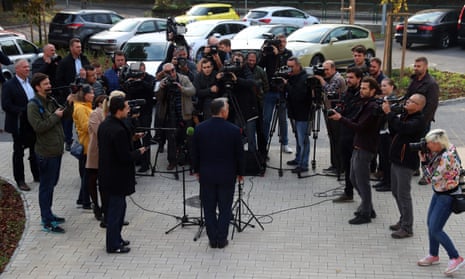Hungarian journalists say a new law supposedly aimed at fighting the coronavirus will make objective reporting of the pandemic harder and leave them open to facing court cases or even jail time for their reporting.
The measures, in place since Monday, have been roundly criticised for the sweeping powers they hand to the nationalist prime minister, Viktor Orbán, to rule by decree. Another part of the bill provides penalties of up to five years in prison for those spreading misinformation during the pandemic.
Journalists in the country say the new law is already being used to deny them access to information, and on occasion to threaten them.
One Budapest-based journalist, who requested anonymity given the current situation in the country, said she had called a hospital over the weekend to follow up on a tip-off about a group of doctors who had reportedly contracted the coronavirus there. “A few minutes later, the hospital’s chief communication officer called me back and asked if I think it’s a good idea to keep asking about this, a day before the government’s bill will be passed,” she said.
Csaba Lukács, a journalist from the weekly newspaper Magyar Hang, said that since the law was passed at the beginning of the week, there had been a rise in threatening comments on social media or in emails warning staff that they would end up in jail. “We are also afraid we might face more lawsuits, which could put us in a very difficult financial situation,” said the journalist.
Hungary is ranked as the second-worst EU member state for press freedom in the most recent list compiled by Reporters Without Borders. A stable of pro-government outlets amplifies the government’s messaging over migration, the main topic of Orbán’s discourse over the past five years, while the independent media landscape has been decimated over recent years.
Orbán’s spokesman, Zoltán Kovács, has lashed out at criticism of the law, and wrote in a recent blogpost that it only covered a very specific offence, “to intentionally spread false information and distortions that could undermine or thwart efforts to protect the public against the spread of the virus”.
But the government has done little to suggest this won’t apply to independent journalists, especially as it frequently accuses them of spreading misinformation as part of a political vendetta against Orbán. In a conference call with foreign reporters last week, Hungary’s justice minister, Judit Varga, said the legal provision was “both adequate and necessary in order to fight malicious disinformation campaigns”. She made it clear that the provision would apply to everyone, including journalists.
The majority of independent journalists in Hungary stressed that they did not believe the law would lead to mass incarcerations, but said they were nevertheless deeply worried. One said their outlet had sought legal advice over how the law might affect its reporting.
Péter Erdélyi, a senior editor at the online portal 444.hu, said the law would have “a chilling effect” on the media landscape. He added that while he did not believe his own outlet would change the way it worked, in some places it could lead to self-censorship. “When people are openly calling for your arrest, even if you don’t think it’s going to happen, it can affect you.”
As of Thursday morning, there were 585 coronavirus cases in Hungary, with 21 confirmed deaths. Recent reports by independent news outlets on the government response to the pandemic include allegations that the relative of a government minister had been selling disinfectant and masks online at marked-up prices, and an investigation into the repeated restructuring of the country’s epidemiological service by recent governments.
Over the past few weeks there has been a chorus of calls from government-aligned commentators for “scaremongering” journalists to be harshly punished. A government-linked businessman has also bought into the country’s largest independent news portal, fuelling fears of interference.
Márton Békés, a pro-government magazine editor and historian, said in a recent discussion on the HirTV channel that Hungary was now in a “war situation” and some opposition media outlets were “openly rooting for the virus”. Another guest on the programme suggested opposition journalists spreading panic should be arrested. There is now specific legal provision to back up these calls.
“What I expect is some overzealous far-right pundit calling the police on some journalists, that is likely to happen. Then we’ll see how they react,” said Szabolcs Panyi, a journalist with the investigative news portal Direkt36.
The new law is also likely to make sources even more wary than before about speaking to the media. Several doctors have declined to speak to the Guardian in recent weeks, citing strict orders from hospital management. One Hungarian journalist said he had been unable to follow up a tip-off about coronavirus cases in a Hungarian school because everybody was scared to speak, even anonymously. “People were scared of talking to journalists, because they were afraid of losing their jobs. Not just doctors and nurses, but school headteachers and parents as well,” he said.
Sixteen of the other 26 EU states released a statement on Wednesday expressing concern over the Hungarian measures – but it did not actually include the word “Hungary”.
In a carefully calibrated piece of trolling, the Hungarian justice ministry responded with a statement saying it was also signing up to the appeal, as Hungary supports the initiative “to ensure the fundamental values of the Union are upheld”.
In a radio interview on Friday, Orbán accused a network led by the Hungarian-American philanthropist financier George Soros of being behind attacks on the law via supposed proxies in Brussels. Orbán frequently attacks Soros, sometimes using antisemitic tropes to paint him as a scheming puppet master.
Additional reporting by Flora Garamvolgyi
